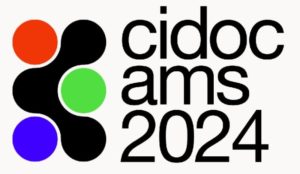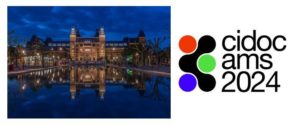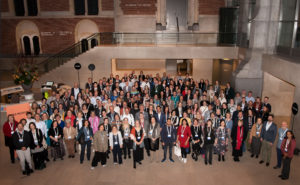2024 Amsterdam
Sustainable Connections: Building Knowledge Networks
Rijksmuseum, Amsterdam, Netherlands November 11-15
Everything is connected. Stories that museum collections tell, connect people with ideas and events across the globe. Research and documentation practices are increasingly collaborations between institutions, communities, and other stakeholders. Now, more than ever, networks of knowledge are built in the digital space too. Sustainable connections is, therefore, the CIDOC’s 2024 conference topic, hosted at the Rijksmuseum in Amsterdam, from 11-15 November 2024.
Sustainable Connections: Building Knowledge Networks underscores the pivotal role of connectivity and collaboration in advancing museum documentation and knowledge sharing.
This conference explores efforts to facilitate the (re)use of collections information – ranging in scope, content, geography and theme – and embrace the lessons learned from developing social, analogue or digital knowledge networks, in order to inspire, expand and connect this work.

WORKSHOPS
-
Inclusive documentation for cultural heritage collections
The workshop is divided into two practical sessions. Firstly, participants will reconstruct the history of a cultural heritage object. The second session invites the participants to a hands-on activity, demonstrating how museum collection documentation can incorporate diverse voices.
Click for more information. -
A Critical Approach to using CIDOC CRM modelling and knowledge base design
This one day course provides a holistic, transdisciplinary, and practical understanding of the CIDOC CRM and provides both the theoretical and methodological principles using real case studies; provides practical instruction and describes a new approach to structuring contextual documentation; introduces simple desktop tools and underpins the organisational case for transferring from database systems to graph systems.
-
Documentation Training Day
The sessions will cover some fundamentals and practical issues – the importance of museum documentation, evaluating and improving documentation quality, setting priorities – as well as recent developments such as the EODEM standard. Also, for anyone interested in getting more involved there will be a special workshop on how to become a CIDOC trainer.
-
Shaping Standards: CIDOC Workshop on Registering Intangible Heritage – Collaborative Feedback & Development
The publication ‘An application profile for recording ICH in museums’ collection management systems’ was presented during last year’s CIDOC 2023 conference. What has shifted since? During this round table we discuss the way forward towards achieving working processes in museums that balance standardization of information with the dynamic nature of intangible heritage.
-
Roundtable Discussion: Defining ‘Museum Documentation’
The Museum Documentation Definition Task Force summons this workshop to gather public input on the definition’s final draft (V.I) and subsequent published materials addressing the issues related to how museum documentation is defined and practiced today. All are encouraged to share their voice and lend the expertise of their experience to this project.
-
Go Open with the GLAM-E Lab: How to build your own an open access policies and workflows
A full-day workshop focused on supporting open GLAM participation among smaller collections holders on how to identify and prepare digital collections for publication to Wikimedia Commons using the CC0 1.0 Universal Public Domain Dedication. It walks participants through the free tools, policies and resources created by the GLAM-E Lab at the University of Exeter.
Click for more information. -
CRM archaeo: limits and scopes of its implementation
This meeting will focus on discussing the documentation of archaeological heritage using the CRM Archaeo extension, its current form, and potential extension. The session picks up and continues with the panel dialogue held during the CIDOC 2023 annual conference between archaeologists and archaeological cultural heritage specialists from Egypt, Peru and Mexico.
Click for more information. -
CRM Spanish Translation Group
This meeting will present the progress of the CIDOC CRM Spanish translation to the CRM SIG, invite new collaborators, receive feedback, and continue consolidating the work program and team. First hour in Spanish, second hour in English.
Click for more information. -
LIDO for Newbies
Lightweight Information Describing Objects (LIDO) has become an established standard format for data exchange, particularly for cultural heritage collections contributing data on their holdings to the German Digital Library and Europeana. The workshop introduces the basic principles and structures of LIDO v1.1 and provides an overview of materials and tools.
-
LIDO Profile Architecture and Other Immovable Works: Deep-Dive
The new LIDO application profile for architecture and other immovable works addresses the specific requirements of documenting this type of object, which is particularly subject to historical change and usually has rich references to other objects. The second part of the talk presents the extension of the LIDO Event Type terminology, which is necessary to represent the various specific events during the existence of a building in a nuanced way.
-
CIDOC LIDO WG Meeting
CIDOC LIDO Working Group Meeting, open to all.
-
Linked Art: Usable Cultural Heritage Linked Data
Linked Art is a metadata application profile of the CIDOC CRM plus extensions, which aims to improve interoperability and usability by recognizing common patterns and providing guidance around formats, scoping and facilitating interaction with the data. The workshop is aimed at both beginners and experienced data modelers. Please bring a laptop or other similar device, knowledge of a favorite artwork to model, and your curiosity.
-
Semantic Reference Data Modelling – Documenting and Reusing Semantic Data Patterns for Sustainable Semantic Data Networks
This workshop will present the work of the Swiss Art Research Infrastructure (SARI) together with Takin.solutions on the creation of a methodology and standard for creating sustainable semantic data through the documentation and reuse of semantic data patterns.
Full workshops program and information

Program Committee
Edward Anderson (Rijksmuseum)
Adele Barbato (Fine Arts Museums of San Francisco)
George Bruseker (Takin.solutions)
Chris Dijkshoorn (Rijksmuseum)
Antoine Isaac (Europeana)
Enno Meijers (National Library of the Netherlands / Dutch Digital Heritage Network)
Trilce Navarrete (Erasmus University Rotterdam)
Lynn Rother (Leuphana University Lüneburg)
Saskia Scheltjens (Rijksmuseum)
Rijksmuseum Local Organizing Committee
Mercia Kerkhof
Jeroen de Meester
Digna van Nielen
Annepiet Nouwen
Fricke Oosten
Sandra Pastoor
Coen Wilders (chair)
Contact
CIDOC24@rijksmuseum.nl
Conference hashtag: #CIDOC2024
